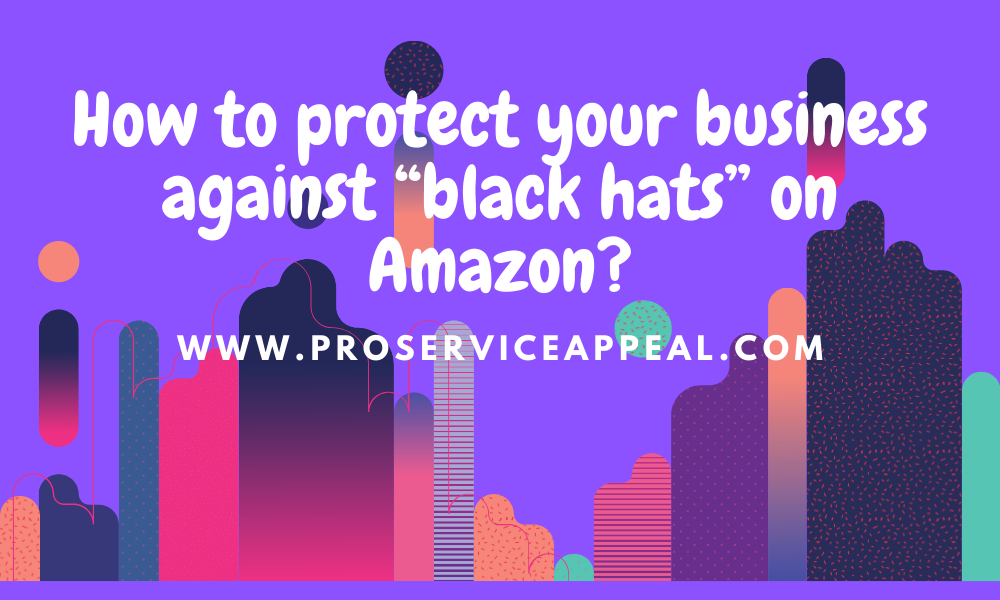Some individuals in the marketplace may be implementing questionable practices. Find out what strategies you can take to protect your business from these bad actors.
Table of Content
- Protect your business on Amazon
- Who are the black hat sellers and consultants on Amazon?
- The practices of “black hat” on Amazon
- How to fight against “black hat” on Amazon?
- Be proactive so as not to be vulnerable on Amazon
Protect your business on Amazon
Product reviews on Amazon are essential to the success of your business (read our article: “Amazon Feedback Request“). 79% of consumers go to Amazon to read reviews before making a purchase. But what if your ratings have been manipulated by unscrupulous sellers?
Many players on Amazon use illegitimate tactics and manipulate the system to overcome competition and “cheat” to get to the top of the search results.
If your Amazon account is sabotaged by a seller with questionable practices, the seller could be temporarily suspended or, worse, permanently closed. It would destroy your reputation in the marketplace. In fact, more than a third (36%) of Amazon sellers say that losing their seller privileges is their biggest concern. Indeed, being a victim of black hat tactics could be devastating.
What are the different forms of dishonest tactics on the marketplace? How to identify them on your account and what are the steps to properly report these tactics to Amazon? Try to proactively put in place certain strategies so that your business is not targeted by these individuals.
Who are the black hat sellers and consultants on Amazon?
The “bad actors” on Amazon can take countless forms: hackers of algorithms, money launderers, merchants of false reports, through collusion between sellers and manufacturers of counterfeits…
Many of these “black hats” come from international markets, notably China, India, and Ukraine. They have no sense of loyalty and unfair competition is common. They pay large sums of money to corrupt consultants – $ 10,000 a month or more according to reports – to identify their competitors’ weak spots and buy stolen data from Amazon that tells them everything they need to know to sabotage other sellers (including your sales data with your top-selling products and your customer data).
These bad players target competitors in all categories, especially subcategories. If you have a healthy and profitable business on Amazon, you have a target on your back. The more successful your business, the more black hat sellers want what you have … Niche categories are particularly targeted because it is much easier to become the # 1 seller in a niche category than in a category of very saturated products.
The practices of “black hat” on Amazon
Below is a list of illegal practices used by black hats on Amazon. This list is obviously not exhaustive.
- Misleading allegations and the addition of keywords “triggers”, such as “false” or “counterfeit”.
- False reviews, false reviews, especially very positive reviews which are clearly false and which will make Amazon feel that you have violated its policy in the field (and that you have hired someone to generate these false reviews).
- Theft of intellectual property (IP). Black hats then record the stolen IP and exclude the legitimate owner of the IP.
- Theft of information, including manipulation of product titles, descriptions, and images.
- The use of multiple accounts. A dishonest seller manages dozens, sometimes hundreds, of accounts offering the same product. This is to illegally reinforce its presence on the Amazon search results page.
- False requests for registration in the trademark register. For example by pretending that your product is a counterfeit for Amazon to remove it.
How to fight against “black hat” on Amazon?
In general, it is very difficult to prove to Amazon that your business has been manipulated by black hats. If your account is affected, you can report the problem by providing as much evidence as you can gather. Based on this evidence, the Amazon team will assess your situation.
However, collecting this evidence is very complicated. Hackers, for example, are experts at covering their tracks. They know how to eliminate the evidence that could go back to them. This is why many victims of unfair commercial practices, crime, and defamation turn to consult companies and hire their own lawyers to prosecute.
This process can take months or more, however, and you cannot sell on Amazon until the issue is resolved. The best way to combat these tactics is to be proactive. These bad actors seek out your weaknesses and exploit them to their advantage (knowing how difficult it is to prove the violation).
Be proactive so as not to be vulnerable on Amazon
To limit your vulnerability on Amazon here are some tips below:
- Anticipate when you are targeted and monitor your account for suspicious activity every week. Any problem should be detected quickly.
- Make sure your products are authorized for sale. They must be flawless. So you will be ready to defend yourself in the event that your articles are falsely declared as being counterfeits.
- Watch your reviews, whether positive or negative. Pay close attention to unusual keywords or claims regarding the safety and quality of your products.
- Test the quality and safety of your products in order to have an appropriate defense in the event that your articles are flagged as dangerous.
- Check your suppliers and make sure they are authorized to sell products for sale on Amazon.
As competition on Amazon intensifies, bad players are increasingly creative in sabotaging their competitors. It is ultimately your responsibility to remain vigilant and limit your vulnerability to ensure that your sales privileges, your brand reputation, and your profitability remain intact.



